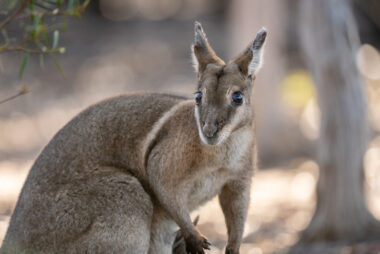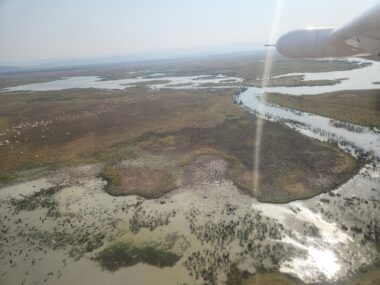Thousands of Victorians and tourists have supported the Otway Coastal Environment Action Network's (OCEAN) Great Ocean Rescue tour opposing seismic blasting, over the last two weeks, attending events, street marches and a paddle out - with the tour's final event in Portland on January 27.
Seismic blasting is used to explore deep below the ocean floor for fossil fuels - usually gas.
OCEAN is a network of coastal community groups along the Great Ocean Road in Victoria, opposing seismic blasting and new gas in the offshore Otway Basin, off Victoria and Tasmania. The four-week Great Ocean Rescue tour was timed to coincide with the summer tourist season along the Great Ocean Road and aims to raise awareness of the destructive effects of seismic blasting.
Sunday's rally and paddle out in Warrnambool was perhaps the highlight of the tour so far. Hundreds of surfers and spectators rallied at Warrnambool’s waterfront to express their objection to the two current proposals to seismic blast over 45,000 square kilometres of ocean directly off their coast.
The city of Warrnambool takes in Logan Beach, a critical calving ground for the endangered Southern Right Whale. After listening to speeches from Lisa Deppeler, Greens MPs Ellen Sandell and Sarah Marshall and Gunditjmara woman Yaraan Couzens-Bundle, over 200 people took to the water on surfboards to show their support for an ocean free of seismic blasting.
Quotes
OCEAN campaigner Lisa Deppeler said, "The vast majority of Australian people have no idea what seismic blasting is, nor the devastation it causes to our marine-life. It’s time to blow the lid on this awful secret and that is the objective of the Great Ocean Rescue Tour."
Marcus Nolle from the Apollo Bay Fishermen’s Cooperative said, “Now that we have the science, seismic blasting is totally unacceptable. Seismic blasting kills the southern rock lobster at every stage of its development. The larvae are pulverized by the blasts whilst the adult fish have their balance mechanism damaged and they become susceptible to predation."
Kim Riskas from the Australian Marine Conservation Society spoke at one of the screenings of the risks associated with carbon capture and storage (CCS), an unsafe and unproven attempt to sequester carbon emissions beneath the ocean floor. This practice also relies on seismic blasting, and the expansion of it is currently under consideration by the federal government.
Gunditjmara woman Yaraan Couzens Bundle said that the home of ‘Koontapool’, the Southern Right Whale, was under direct threat from seismic blasting. “We as First Peoples, we don’t own the land, we belong to it, and those connections span back eons of time. In Gundijmara Country seismic blasting can never coexist peacefully with ancient living creation songlines and our sacred traditions,” she said. “We can, we must and we will shut this damaging blasting down."
No More Gas campaigner for Friends of the Earth Melbourne, Freja Leonard, spoke of the dangers to the ocean and climate if seismic blasting is allowed to go ahead in the Southern Ocean. “By the time the blasting is done and the gas is drilled, over a decade will have passed and the next decade is critical for climate action. Either the gas exploration and production industry dies, or we do, along with a liveable climate!"
Background information on the tour
Seismic blasting is used to explore deep below the ocean floor for fossil fuels. Blasts of up to 250 decibels - louder than an atomic bomb - are made by air guns dragged behind a ship every ten seconds, 24 hours a day, often for months on end. It has a devastating impact on marine life, from tiny zooplankton through to whales, including several endangered species. A current proposal to blast 45,000 square kilometres of the Otway Basin (almost the size of Tasmania) takes in waters of unique biodiversity in Victoria and Tasmania, including parts of Zeehan Marine Park, and will directly impact important fishing grounds.
The tour kicked off on 5 January in Barwon Heads with a screening of the Surfrider Foundation documentary, Southern Blast, followed the next day by a street rally in Ocean Grove. Subsequent screenings and rallies have been held in Torquay, Wye River, Apollo Bay, Port Fairy and now Warrnambool. Thousands of people have attended these events across several weekends.
Apollo Bay saw its largest street rally yet, with some 350 people turning out to march down the main street and on to the foreshore. Local storekeepers and tourists applauded the marchers, against a backdrop of Carlie Reeves’ stirring song ‘Upwelling’. Apollo Bay fishers, who are strong supporters of OCEAN, lead the march with their banner reading “Save Our Seafood”.
OCEAN is supported by Surfrider Foundation Australia, Southern Ocean Protection Embassy Collective (SOPEC), the Australian Marine Conservation Society, Fight for the Bight, Friends of the Earth Melbourne, and Patagonia.
Key Facts:
Credit: @oj.annett (Ollie Annett)
Further information: https://www.ocean.
Contact details:
- Lisa Deppeler, campaigner, OCEAN, 0456 931 323
- Mitch Pope, campaigner, OCEAN, 0408 373 063


